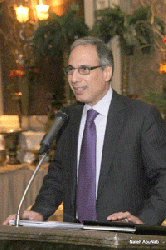DEARBORN — On Tuesday, March 13, 2012 Vice Governor of the Central Bank of Lebanon Raed Charafeddine visited the University of Michigan-Dearborn campus to give a speech on the economic status of the Middle East a year after the Arab uprisings. The event was sponsored by the economics faculty and the Students Economic Club of UM-D. The Arab Student Union also sponsored an event about missing Imam Moussa Sadr of Lebanon at which Charafeddine spoke on Monday.

|
| Charafeddine at Byblos Banquet Hall. PHOTO: Nafeh AbuNab |
Charafeddine is the first Vice Governor of the Central Bank of Lebanon and has held the position since April 2009. He gained a great deal of banking and financial advising experience in several Middle Eastern and Muslim banking offices, economic councils and more, giving him insight into the financial situations faced by the area, especially in Lebanon.
Charafeddine on Tuesday primarily spoke on the Arab uprisings and politics of several Middle Eastern countries as well as the future of the region economically.
“The revolution was sparked by the absence of leadership and was further worsened by the citizens relying on Western support and patronage,” he said.
The vice governor noted the two main strengths of the region economically, one of which being the vast oil and gas resources. According to Charafeddines’ statistics, “about 57-60% of the region is oil reserves.”
He also said that the amount of human resources is remarkable as well. The region is made up of about 335 million people and about 65% of the population is under 25.
However, the region is also plagued by major weaknesses economically, including rampant government corruption and poor income distribution. Charafeddine also pointed out what he called a surprising intrinsic weakness in the Middle East. While oil and gas have been profitable ventures for many countries, he believes the lack of economic diversification and dependence on oil hurts.
“Arab awakening is about transformation” Charafeddine said, speaking about the future of the uprisings and the demands of the people, noting that the transformation should include economic freedom as well as freedom from an oppressive government. He remained hopeful that such a movement could eventually blossom.
Bank still gathering info on FATCA laws
Charafeddine also attended various community events, including a dinner on Thursday hosted by the Lebanese International Business Council at Byblos Banquet Hall. He spoke about the country’s current financial situation, which he characterized as strong, the importance of U.S. immigrants contributing to economic growth in Lebanon, and also about the forthcoming Foreign Account Tax Compliance Act by the U.S., which will be implemented officially on Jan. 1, 2013. A first draft came out last month and a final draft will be presented in the middle of 2012.
The FATCA is designed to discourage tax evasion; under it, a foreign financial institution, whether banks, asset brokers, investment companies, or certain insurance companies (as examples) may be required to disclose personal banking information about individuals suspected of tax evasion.
Charafeddine said that the Central Bank of Lebanon will likely go into an agreement with FATCA and wants to fulfill that obligation, but also said that banking secrecy is a major pillar in the country’s banking sector and something they’d like to maintain if possible.
He said that the banking system has plenty of ways to investigate possible cases of tax evasion already.
Charafeddine told various crowd members that he wasn’t able to answer their specific questions in regards to FATCA just yet, however, saying the bank was still examining the upcoming regulations.
“I can’t tell you much at this stage except that we’re weighing it, hoping to comply and at the same time to keep the integrity of our banking system…if and when anything happens, we have time, and we will keep people informed on our website (//bdl.gov.lb).”
– Nick Meyer contributed to this report






Leave a Reply